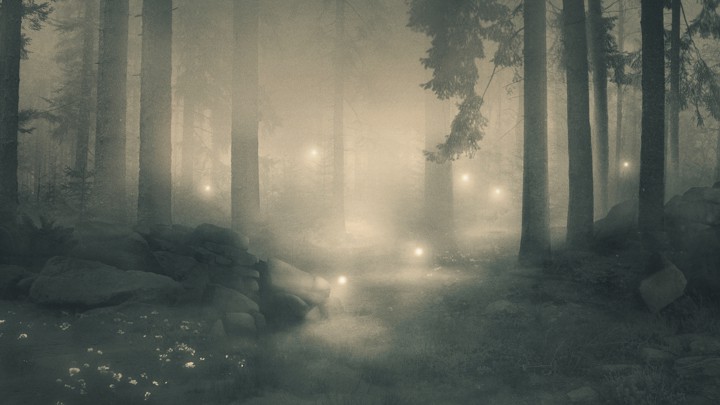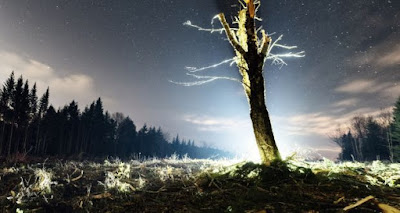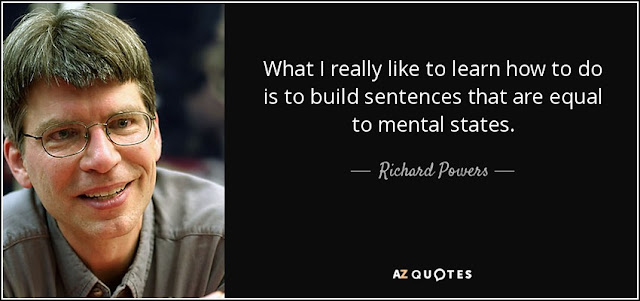
I
approached The
Overstory
with the kind of wavering
curiosity those apes in 2001:
A Space Odyssey had
for the mysterious, shiny
black
monolith,
only without the momentous "Also
sprach
Zarathustra" lurking
in the background (no
doubt it
could
have been, by sheer random coincidence, but I don't listen to the
radio anymore).
What
snagged
a pause
during my maiden flip-through of The
Atlantic's
June issue was Polish
artist Dawid
Planeta's spooky photo illustration with
a book
review by
Nathaniel Rich titled "Rhapsody
in Green."
It was the subtitle that pulled
me closer:
"The
dark optimism of Richard Powers's climate-themed, tree-mad novel."
In
retrospect, the oxymoronic
sense of "dark optimism" is what led me into the review
itself—that and the two pull-out quotes. The first:
"The
Tree of Life will fall again, collapse into a stump of invertebrates,
tough ground cover, and bacteria."
And
on the next page:
"The best way to cure man's 'suicidal appetite' for growth is
to hasten the inevitable suicide."
My
brain
gasped.
Those
two quotes summoned
synapse connections I’d
been toying with more and more frequently of late.
YES!!
I
wanted to shout, but
suppressed the urge knowing
the hair stylist
next door might
well
have jumped
and spilled
a bottle of rainbow dye on some elderly client's wispy white
coiffure. I read
the review, and the review persuaded me to consider The
Overstory
as my next weekly
contribution
to the Friday's
Forgotten Books
blogging group. I had to consider
that
a new release hardly qualified as a "forgotten book," yet
I rationalized
it might be one of those books that easily could slip into neglect
because of its uncomfortable
subject
and behemoth length—502 pages, a veritable sequoia compared to the usual
elms and maples of
noveldom.
It probably
needs
to become a classic among the
dedicated
literati before less
trendy sensibilities
feel
compelled
to crack the cover and find out what it is all a-bout (It
took me decades of false starts before finally groaning
into
a life jacket
and rowing
through the entire
gauntlet of esoteria,
biblicalia,
symbolism, and
soaring
poetry in
the leviathan Melville reputedly had a whale of a time finding a
publisher for back
in the day).
Richard
Powers, whom I confess I’d not known of, was already well
established in the halls of literary recognition when he gave us The
Overstory.
To
avoid the tedium
of listing his creds, I’ll simply give you a link to the bio on his website. I
will say this, the guy is no one to sneeze at in so many fields I’m
embarrassed at my
dearth of life accomplishments by
comparison. But I was
ignorant of
this as my finger hovered
over the one-click-download button on Amazon.
I
still
had to reconcile
the book’s
oddness
and
newness with
the Friday folks’ expectations. Our
weekly assemblage is eclectic enough, offering
a range of tastes that
includes
speculative
fiction,
fantasy,
western,
mystery,
thriller, horror,
noir,
and
the occasional nonfiction work. Again, I think the descriptions “dark
optimism” and “suicidal appetite” were the deciders, and I
clicked the button and watched The
Overstory
load onto my laptop’s Kindle app.
Soon
into the reading I could see it touched
several of the expected Friday
categories. My biggest concern at first was to
determine if the fiction
was
fantasy or based on factual knowledge, because if the latter then it
most definitely exemplifies the adage “truth is stranger than
fiction.”
Turns
out it’s a blend, with the ambiguity set at the git-go as a
mystical, poetic introduction to the first of the book’s four
architectural divisions:
...in
a park above a western city after dusk, the air is raining messages.
A
woman sits on the ground, leaning against a pine. Its bark presses
hard against her back, as hard as life. Its needles scent the air and
a force hums in the heart of the wood. Her ears tune down to the
lowest frequencies. The tree is saying things, in words before words…
All
the ways you imagine us— bewitched mangroves up on stilts, a
nutmeg’s inverted spade, gnarled baja elephant trunks, the
straight-up missile of a sal— are always amputations. Your kind
never sees us whole. You miss the half of it, and more. There’s
always as much belowground as above.
That’s
the trouble with people, their root problem. Life runs alongside
them, unseen. Right here, right next. Creating the soil. Cycling
water. Trading in nutrients. Making weather.
Building atmosphere. Feeding and curing and sheltering more kinds of
creatures than people know how to count.
A
chorus of living wood sings to the woman: If your mind were only a
slightly greener thing, we’d drown you in meaning.
The
pine she leans against says: Listen. There’s something you need to
hear.
Nice,
but I’m not a fantasy buff. A little in a poem or
a prologue like this,
maybe, but not for a whole novel. My
skepticism got serious when one of the characters, a scientist,
speaks as if trees have an intelligence most of us have never dreamed
of. “Trees know when we’re close by,” she said. “The
chemistry of their roots and the perfumes their leaves pump out
change when we’re near...When you feel good after a walk in the
woods, it may be that certain species are bribing you. So many wonder
drugs have come from trees, and we haven’t yet scratched the
surface of the offerings. Trees have long been trying to reach us.
But they speak on frequencies too low for people to hear.”
Needing
to know more, to find out if this was just Powers carrying his misty
dream from poetry into prose, I paused awhile and started Googling to
see what real science might be saying about these things. I wasn’t
the only one. Barbara
Kinsolver writes in The
New York Times,
“The
major players number more than a dozen, all invested with touching
humanity, and they arrive with such convincing, fully formed résumés,
it’s hard to resist Googling a couple of them to see if they’re
real people. (They aren’t.) This is a gigantic fable of genuine
truths held together by a connective tissue of tender exchange
between fictional friends, lovers, parents and children.” And, one
might add, “leaves, branches, trunks, and roots.”
Reading
deeper into the forest primeval and its human friends, my curiosity
craving more facts, I even looked up what one character, who reminded
me of Jeff Bridges’s "Dude" in The
Big Lebowski,
describes as his experience in what I learned was the controversial
Stanford
Prison Experiment.
And
when another character, called “Maidenhair,” lives for over a
year on a platform two-hundred feet high in a giant Redwood tree to
save if from loggers, my
Googling
found Julia“Butterfly” Hill,
an American forest activist who
lived on such a platform in California for nearly two years.
The Overstory was not
just a fascinating read for me, friends, it was an education. And as
a fledgling student in this brand new field, for me, I am in no way
qualified to give anyone a traditional “review” of the book. What
I’m doing instead is providing links to professional reviewers in
the hope they might persuade you to read The Overstory
yourself, and form your own opinions on its subject matter and
merits.
 |
| Julia "Butterfly" Hill |
Here’s
John
Dominee in
The Sewanee Review:
“Breadth
like this is a departure for Powers, though roving among different
points of view is his usual MO. Still, he’s never been so
Tolstoyan, plucking dreams from so many heads.
A
reviewer faces a steep challenge trying to show how things come
together...
“Happy endings, in the
ordinary sense, have no place in a text that renounces ordinary
notions of human progress.
Eoin McNamee in The Irish Times: The Overstory might be a good book, and it might be a bad book. It might be a novel that reaches out for the unattainable and falls short of it, or a novel that overshoots its own good intentions. You can’t say it works as a piece of prose and you can’t say that it doesn’t work. You don’t know whether you should read it transfixed by the shadow of the fall of man, or throw it at the wall and run screaming into the forest...
“He dazzles and sandbags you
with messianic end-of-time prose and then you’re ankle-deep in the
corporate sleight of hand involved in the delivery of old-growth
forests to logging interests, or looking at the legal structures
required to grant actual rights to trees...
“Borges is there along with
ambrosia beetles. Kant. You’re in the middle of a storm of thought
which has been wrestled into the shape of a novel by a writer’s act
of will. A
neuron blast of high-mindedness.
You get to the brink of whimsy then you’re hauled back: “Reefs
bleach and wetlands dry. Things are going lost that have not yet been
found.”
And,
finally, Nathaniel
Rich in The
Atlantic,
which
sold me on the book. This from the second paragraph of his review:
“A former computer
programmer and English major at the University of Illinois at
Urbana-Champaign, Powers has written novels about the history of
photography, artificial intelligence, nuclear warfare, race and
miscegenation, the Holocaust, neuroscience, virtual reality, the
chemical industry, and genetic engineering. It was only a matter of
time before he took on the greatest existential crisis human
civilization faces: the destruction of the natural conditions
necessary for our own survival.”
Amen.
[For
more Friday's Forgotten Books check the links on Patti
Abbott's unforgettable blog]






I've read a couple of Richard Powers's novels. He uses DRAGON software to dictate his novels to his computer.
ReplyDeleteWow. I couldn't do that to write a shopping list!
DeleteRather simpler in approach, but nonetheless: Erle Stanley Gardner dictated most of his novels after a fairly early point.
DeletePowers (not the visual artist Richard Powers, of course) has been one of the fantasy darlings of those who aren't comfortable with fantasy for some years now, as you might've gathered...and much of what you mention here sounds like he's been reading the more mystical sort of Deep Ecologist, as they tend to tag themselves, who are in the sort of activist group as Earth First! and were also big fans, and vice verse, of Edward Abbey. (But, then, all Deep Ecologists tend to be a bit mystical and not a little misanthropoc.) I think you'd be likely to have mind similarly blown by the likes of R. A. Lafferty, Jonathan Lethem, David R. Bunch, John Brunner at his most relevant (he wrote a lot of different kinds of work), William Kotzwinkle likewise, J. G Ballard, Kate Wilhelm if you haven't tried her work...an excellent place to start in this wise would be THE CLONE, with Theodore Thomas, and, surprise!, Ursula K. Le Guin. They might not rock your boat quite as hard, but you'll have a fuller sense of some of what's been done before.
ReplyDeleteAs a kid, I found the Stanford Prison Experiment rather terrifying...first saw something about it on a documentary when I was 8yo or so...possibly even an early NOVA episode. Of course, seeing the film OBEDIENCE not too long after didn't make me any happier, but it did explain a whole lot about why so many of our fellow humans Sure Love or are Afraid Not to Take Orders. https://www.youtube.com/watch?v=mOUEC5YXV8U
I'm such a novice in this area I recognize none of those names, Todd. I was blown away by the blizzard of notions and references, and am planning to read next The Echo Maker.
DeleteI don't mean to dismiss Powers at all, btw...but instead the notion he has to be held as unique in what he has done here, to the extent that No One, certainly not writers such as those I've cited above, could possibly have done anything similar. His treatment thus is all too common. You might not care for all their work, but I suspect if you gave Brunner's STAND ON ZANZIBAR or THE CLONE a try, you'd be happy with the not too dissimilar experience. And, certainly, Ballard and Le Guin. I strongly suspect Lafferty's best work would suit you down to the ground.
DeleteActually, having never heard of Powers, I was taken more by the topic.
DeleteThis comment has been removed by the author.
DeleteYes. Which is why I cited particularly the writers and their specific works above...relevance and good to brilliant quality. I haven't read the VanderMeer books yet, but they also tackle similar matter.
DeleteI kind of hop around and cherry pick, Todd. I don't have the attention span to go the distance with most writers or genres or topics. This one caught my fancy, but I'll probly move on after The Echo Maker.
DeletePowers might also have taken a cue from the recent, and recently much fawned-over, work of Jeff VanderMeer. The "serious" literature sorts will "discover" the occasional speculative fiction writer who must be That much different from all the other SF writers because WE ALL SAY SO AND SHUT UP. And then their grumpier fellow denizens, of course, mock them for liking anything that wasn't Invented By Their Community. Some of that crowd gives the side-eye to the likes of Joyce Carol Oates and the like...and the likes of Margaret Atwood tries desperately to stay on their good side.
ReplyDeleteI've no interest at all in getting caught up in a genre or hierarchical literature. I pretty much don't like groups, either, of any kind.
DeleteWell, snobbery doesn't help, no. But the examples of fantastic fiction that are published as fantastic fiction that are adopted by the kind of reviewer who usually writes for THE ATLANTIC are usually almost arbitrarily selected, and usually also held up as being So Very Much Different than any other examples published in the field, and that insisted upon until they collectively stumble across another such writer. Anthony Burgess, Guy Davenport, Dorothy Parker and some others who have written book reviews for THE ATLANTIC and similar magazines over the decades have been sterling counterexamples, actually knowledgeable about the literature beyond the Officially Approved.
DeleteWe as readers, any more than fiction generally, can't escape genre...everything has a model. You don't have to read everything in a genre to read, for example, selected crime fiction or contemporary/mimetic fiction or historical fiction or speculative fiction.
I agree. Again, my interest lies in topics and in a reasonable expectation of excellence in the craft of addressing those topics. As to The Atlantic, it's the only magazine I read anymore, so I suppose my contemporary horizons are a tad limited.
DeleteHARPER'S is usually a good complement to THE ATLANTIC, which has been disappointing me since what I considered its high point in my reading new issues in the early '80s. When they had Anthony Burgess as their primary book reviewer, I was very happy about that, and the articles were usually very impressive. I'd say from my dipping into back issues, they were even better in the early '60s.
DeleteThe writing seems to have gotten snarkier in recent years, but they have on staff a couple of first-rate wordsmiths who come to mind, my favorite being James Parker. I used to subscribe to Harper's but haven't even seen an issue in decades--so long ago I'd forgotten about the magazine. I'm going to check their website. Thanks for the long-overdue reminder!
DeleteThe only thing I know about Richard Powers is that his first novel is Three Farmers on Their Way to a Dance and my husband read it and liked it a lot. From what I read about his books, it sounds like they cover a variety of subjects. Maybe someday I will try one of them.
ReplyDeleteI'm fixing to read The Echo Maker next, Tracy. It's about as long as The Overstory, which was a full meal for me.
Delete